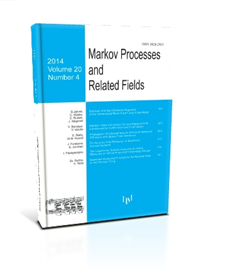A Double Dilation Constructed from a Double Product of Rotations
R.L. Hudson
2007, v.13, Issue 1, 169-190
ABSTRACT
Motivated by discrete approximations similar to those which originally [R.L. Hudson and P.D.F. Ion, The Feynman - Kac formula for a quantum mechanical Wiener process. In: "Random Fields (Esztergom, 1979)", J. Fritz, J.L. Lebowitz, and D. Szasz (eds.), Vol. 2, North-Holland, Amsterdam, 1981, 551-568] led to the construction of the time orthogonal unitary dilation [R.L. Hudson, P.D.F. Ion and K.R. Parthasarathy, Time-orthogonal unitary dilations and noncommutative Feynman - Kac formulae. Commun. Math. Phys., 1982, v. 83, 261-280] we construct explicitly a family $\mathcal{W}=\{W_{a,t}^{b,s}\}$ of continuous double products of infinitesimal rotations in the Hilbert space $L^2(R^{+}) \oplus L^2(R^{+}).$ Each $W_{a,t}^{b,s}$ is a unitary operator acting nontrivially only on the subspace $L^2(]a,b])\oplus L^2(]s,t]).$ For fixed $s,t,$ $W_{a,t}^{b,s}$ is an evolution in $a,b$ and for fixed $a,b$ a reverse evolution in $s,t.$ $W_{a,t}^{b,s}$ behaves covariantly under translation and time reversal in $L^2(R^{+}).$ The family $\mathcal{W}$ forms a simultaneous dilation of two mutually adjoint families of contraction semigroups.
Keywords: double product,infinitesimal rotations,dilation
COMMENTS
Please log in or register to leave a comment

